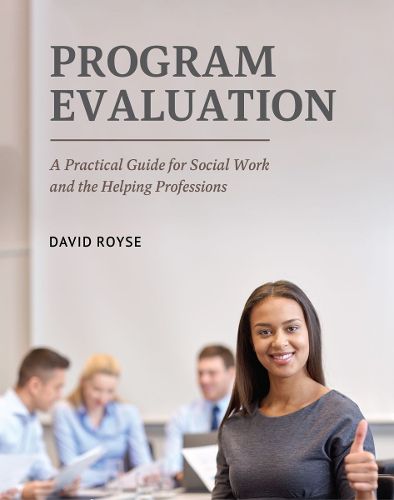Readings Newsletter
Become a Readings Member to make your shopping experience even easier.
Sign in or sign up for free!
You’re not far away from qualifying for FREE standard shipping within Australia
You’ve qualified for FREE standard shipping within Australia
The cart is loading…






This title is printed to order. This book may have been self-published. If so, we cannot guarantee the quality of the content. In the main most books will have gone through the editing process however some may not. We therefore suggest that you be aware of this before ordering this book. If in doubt check either the author or publisher’s details as we are unable to accept any returns unless they are faulty. Please contact us if you have any questions.
How do you uncomplicate the subject of program evaluation for students without being too simplistic? David Royse focuses on what readers really need to understand in order to apply useful program evaluation techniques in their practice serving individual clients, couples, and families. Drawing on decades of teaching this subject, he skillfully takes an incremental approach to teaching so that students aren't overwhelmed by information that they won't necessarily use in professional settings. He develops readers' interest in each new chapter's topic by incorporating real-life scenarios, excerpts from articles on program evaluation, and his own personal experiences in assessing and evaluating programs.
Each chapter contains suggestions for additional reading and examples from current literature. These interesting-to-read segments not only show students that program evaluators and practitioners actually use these techniques, but they also gently expand readers' knowledge of the field. Helpful features such as review questions and skill assessments are found at the end of each chapter. This text is also unique in the amount of coverage it provides on cultural sensitivity-ways of understanding the concept and assessing its presence (or absence) among employees in agencies.
Highly accessible and practical in its approach, this book is designed for undergraduates or graduate students in social work, counseling, and health-related programs and available for adoption in-classroom, online, or hybrid courses.
$9.00 standard shipping within Australia
FREE standard shipping within Australia for orders over $100.00
Express & International shipping calculated at checkout
This title is printed to order. This book may have been self-published. If so, we cannot guarantee the quality of the content. In the main most books will have gone through the editing process however some may not. We therefore suggest that you be aware of this before ordering this book. If in doubt check either the author or publisher’s details as we are unable to accept any returns unless they are faulty. Please contact us if you have any questions.
How do you uncomplicate the subject of program evaluation for students without being too simplistic? David Royse focuses on what readers really need to understand in order to apply useful program evaluation techniques in their practice serving individual clients, couples, and families. Drawing on decades of teaching this subject, he skillfully takes an incremental approach to teaching so that students aren't overwhelmed by information that they won't necessarily use in professional settings. He develops readers' interest in each new chapter's topic by incorporating real-life scenarios, excerpts from articles on program evaluation, and his own personal experiences in assessing and evaluating programs.
Each chapter contains suggestions for additional reading and examples from current literature. These interesting-to-read segments not only show students that program evaluators and practitioners actually use these techniques, but they also gently expand readers' knowledge of the field. Helpful features such as review questions and skill assessments are found at the end of each chapter. This text is also unique in the amount of coverage it provides on cultural sensitivity-ways of understanding the concept and assessing its presence (or absence) among employees in agencies.
Highly accessible and practical in its approach, this book is designed for undergraduates or graduate students in social work, counseling, and health-related programs and available for adoption in-classroom, online, or hybrid courses.